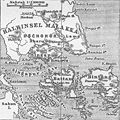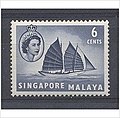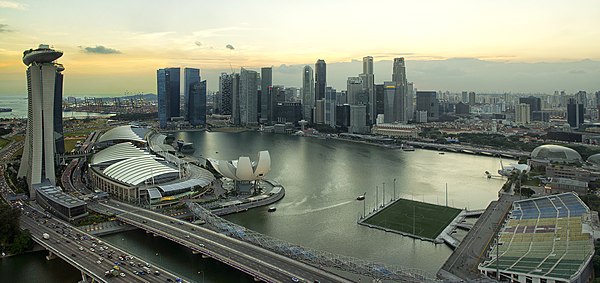Portal:Singapore
 Map of Singapore Singapore, officially the Republic of Singapore, is an island country and city-state in maritime Southeast Asia. It is located about one degree of latitude (137 kilometres or 85 miles) north of the equator, off the southern tip of the Malay Peninsula, bordering the Strait of Malacca to the west, the Singapore Strait to the south along with the Riau Islands in Indonesia, the South China Sea to the east, and the Straits of Johor along with the State of Johor in Malaysia to the north. The country's territory comprises one main island, 63 satellite islands and islets, and one outlying islet; the combined area of these has increased by approximately 25% since the country's independence as a result of extensive land reclamation projects. It has the second highest population density of any country in the world, although there are numerous green and recreational spaces as a result of urban planning. With a multicultural population and in recognition of the cultural identities of the major ethnic groups within the nation, Singapore has four official languages: English, Malay, Mandarin, and Tamil. English is the common language, with its exclusive use in numerous public services. Multi-racialism is enshrined in the constitution and continues to shape national policies in education, housing, and politics.
Singapore's history dates back at least eight hundred years, having been a maritime emporium known as Temasek and subsequently a major constituent part of several successive thalassocratic empires. Its contemporary era began in 1819, when Stamford Raffles established Singapore as an entrepôt trading post of the British Empire. In 1867, the colonies in Southeast Asia were reorganised, and Singapore came under the direct control of Britain as part of the Straits Settlements. During World War II, Singapore was occupied by Japan in 1942 and returned to British control as a separate Crown colony following Japan's surrender in 1945. Singapore gained self-governance in 1959 and, in 1963, became part of the new federation of Malaysia, alongside Malaya, North Borneo, and Sarawak. Ideological differences, most notably the perceived encroachment of the egalitarian "Malaysian Malaysia" political ideology led by Lee Kuan Yew into the other constituent entities of Malaysia—at the perceived expense of the bumiputera and the policies of Ketuanan Melayu—eventually led to Singapore's expulsion from the federation two years later; Singapore became an independent sovereign country in 1965. After early years of turbulence and despite lacking natural resources and a hinterland, the nation rapidly developed to become one of the Four Asian Tigers. With its growth based on international trade and economic globalisation, it integrated itself with the world economy through free trade with minimal-to-no trade barriers or tariffs, export-oriented industrialisation, and the large accumulation of received foreign direct investments, foreign exchange reserves, and assets held by sovereign wealth funds. As a highly developed country, it has one of the highest GDP per capita (PPP) in the world. Identified as a tax haven, Singapore is the only country in Asia with a AAA sovereign credit rating from all major rating agencies. It is a major aviation, financial, and maritime shipping hub and has consistently been ranked as one of the most expensive cities to live in for expatriates and foreign workers. Singapore ranks highly in key social indicators: education, healthcare, quality of life, personal safety, infrastructure, and housing, with a home-ownership rate of 88 percent. Singaporeans enjoy one of the longest life expectancies, fastest Internet connection speeds, lowest infant mortality rates, and lowest levels of corruption in the world. Singapore is a unitary parliamentary republic in the Westminster tradition of unicameral parliamentary government, and its legal system is based on common law. While the country is de jure a multi-party democracy with free elections, the government under the People's Action Party (PAP) wields widespread control and dominance over politics and society without much electoral competition. The PAP has governed the country continuously since full internal self-government was achieved in 1959, and currently holds a supermajority with 79 out of 93 elected seats in Parliament. One of the five founding members of ASEAN, Singapore is also the headquarters of the Asia-Pacific Economic Cooperation Secretariat, the Pacific Economic Cooperation Council Secretariat, and is the host city of many international conferences and events. Singapore is also a member of the United Nations, the World Trade Organization, the East Asia Summit, the Non-Aligned Movement, and the Commonwealth of Nations. (Full article...)Selected article -I Not Stupid (Chinese: 小孩不笨; pinyin: Xiǎohái Bù Bèn; lit. 'Children are not stupid') is a 2002 Singaporean comedy film about the lives, struggles and adventures of three Primary 6 pupils who are placed in the academically inferior EM3 stream. Written and directed by Jack Neo, and produced by Mediacorp Raintree Pictures, the film stars Huang Po Ju, Shawn Lee, Joshua Ang, Xiang Yun, Jack Neo, Richard Low and Selena Tan. Released in cinemas on 9 February 2002, I Not Stupid earned over S$3.8 million, becoming the second-highest grossing Singaporean film. Its satirical take on the Singaporean education system and social attitudes in Singapore sparked public discussions and parliamentary debates that led to reforms in the education system. A standalone second installment titled I Not Stupid Too, was released on the 26 January 2006. Another standalone third installment titled I Not Stupid 3, is scheduled to be released on the 6 June 2024. (Full article...)Selected picture Saint Joseph's Church on Victoria Street during a Good Friday evening procession. Read more... General imagesThe following are images from various Singapore-related articles on Wikipedia.
Selected biography -Edwin Nadason Thumboo B.B.M. (born 22 November 1933) is a Singaporean poet and academic who is regarded as one of the pioneers of English literature in Singapore. Thumboo graduated in English from the University of Malaya in 1956. Although he applied for a position at the university, he was rejected as few locals held academic posts at that time. He therefore worked in the civil service for about nine years before finally joining the university, then renamed the University of Singapore, in 1966 following Singapore's independence. He received a Ph.D. from the university in 1970. Thumboo rose to the position of full professor in the Department of English Language and Literature, heading the department between 1977 and 1993. After the merger of the University of Singapore and Nanyang University in 1980 to form the National University of Singapore (NUS), he was the Dean of the Faculty of Arts and Social Sciences from 1980 to 1991, NUS's longest-serving dean of the Faculty of Arts and Social Sciences. Thumboo was the first Chairman and Director of the university's Centre for the Arts from 1993 to 2005, and continues to be associated with the university as an emeritus professor, a position he has held since retiring from full-time teaching in September 1997. (Full article...)Did you know (auto-generated)
In this month
More did you know -
Related portalsSoutheast Asia Other Countries Tasks
CategoriesWikiprojectsAssociated WikimediaThe following Wikimedia Foundation sister projects provide more on this subject:
Discover Wikipedia using portals |





























































